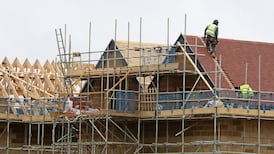The wealth of Ireland's nine billionaires has increased by €18.3 billion since the start of the Covid-19 crisis, according to Oxfam, as it called for "extreme wealth" globally to be subject to a special tax to help fund the recovery from the pandemic.
That represented a 58 per cent increase, to €49.7 billion, between March 2020 and November last year, it said of the Irish list, which is led by 93-year-old construction magnate Pallonji Mistry, the Indian-born Irish citizen who controls Indian engineering business Shapoorji Pallonji Group.
Stripe founders Patrick (33) and John Collison (31), whose personal fortunes have both surged to an estimated €8.3 billion each following a fundraise at the payments giant last year, are joint second on the Irish list.

Oxfam, which uses Forbes figures for its list, said the world’s 10 richest men more than doubled their fortunes from to €1.3 trillion – at a rate of €1.13 billion a day – during the first 21 months of the pandemic.
"Billionaires have had a terrific pandemic. Central banks pumped trillions of euro into financial markets to save the economy, yet much of that has ended up lining the pockets of billionaires riding a stock market boom," said Oxfam Ireland's chief executive, Jim Clarken.

"Now is the time to redress that imbalance through progressive wealth taxes, along with other progressive measures such as debt relief and cancellation. Within the EU, the Irish Government could lead by example by introducing a wealth tax of 1.5 per cent on the very wealthiest which would have a positive effect on Ireland's society as it recovers from the pandemic."
World Economic Forum
The annual Oxfam inequality report is usually published immediately before the traditional annual January meeting of world political and business leaders at the World Economic Forum (WEF) in the Swiss sky village of Davos. However, the event has been deferred until summer this year, following its cancellation in 2021, amid concern over the spread of Covid-19.
WEF is holding a series of Davos Agenda virtual event this week to allow world leaders "to come together to share their visions for the year ahead".
The latest Oxfam report says that inequality is contributing to the death of at least 21,000 people each day, or one person every four seconds, based on deaths globally from lack of access to healthcare, gender-based violence, hunger and climate breakdown.

The WEF’s own latest annual Global Risks Report, published last week, highlighted that the world economy faces “constant volatility and multiple surprises” over the next three years as vaccine inequality and a Covid-induced widening of the income gap between the richest and poorest countries stoke geopolitical tension.
This will threaten co-operation on some of the biggest global challenges of the future, such as climate change, the WEF said in its latest annual Global Risks Report, based on a survey of about 1,000 experts, policymakers and industry leaders.
Vaccine inequality and a resultant uneven economic recovery risk compounding social fractures and geopolitical tensions, it warned, noting that in the poorest 52 countries – home to 20 per cent of the world’s people – only 6 per cent of the population had been vaccinated as of the end of last year.

The world's richest man, according to Forbes data, is Amazon founder Jeff Bezos, who is worth an estimated $177 billion (€155 billion), followed by magnate Elon Musk, one of the founders of PayPal and co-founder and chief executive of Tesla.
Fourth place on the Irish list is John Grayken, founder of US private-equity group Lone Star Funds, who became an Irish citizen in 1999. His wealth is put at €6.5 billion.
He is followed by businessman Denis O'Brien, whose net worth is put at €2.5 billion, and Kingspan founder Eugene Murtagh, estimated to be worth €1.4 billion. All figures are based on current foreign exchange rates with the dollar, the currency in which Forbes bases its estimates.











